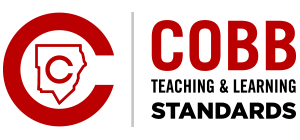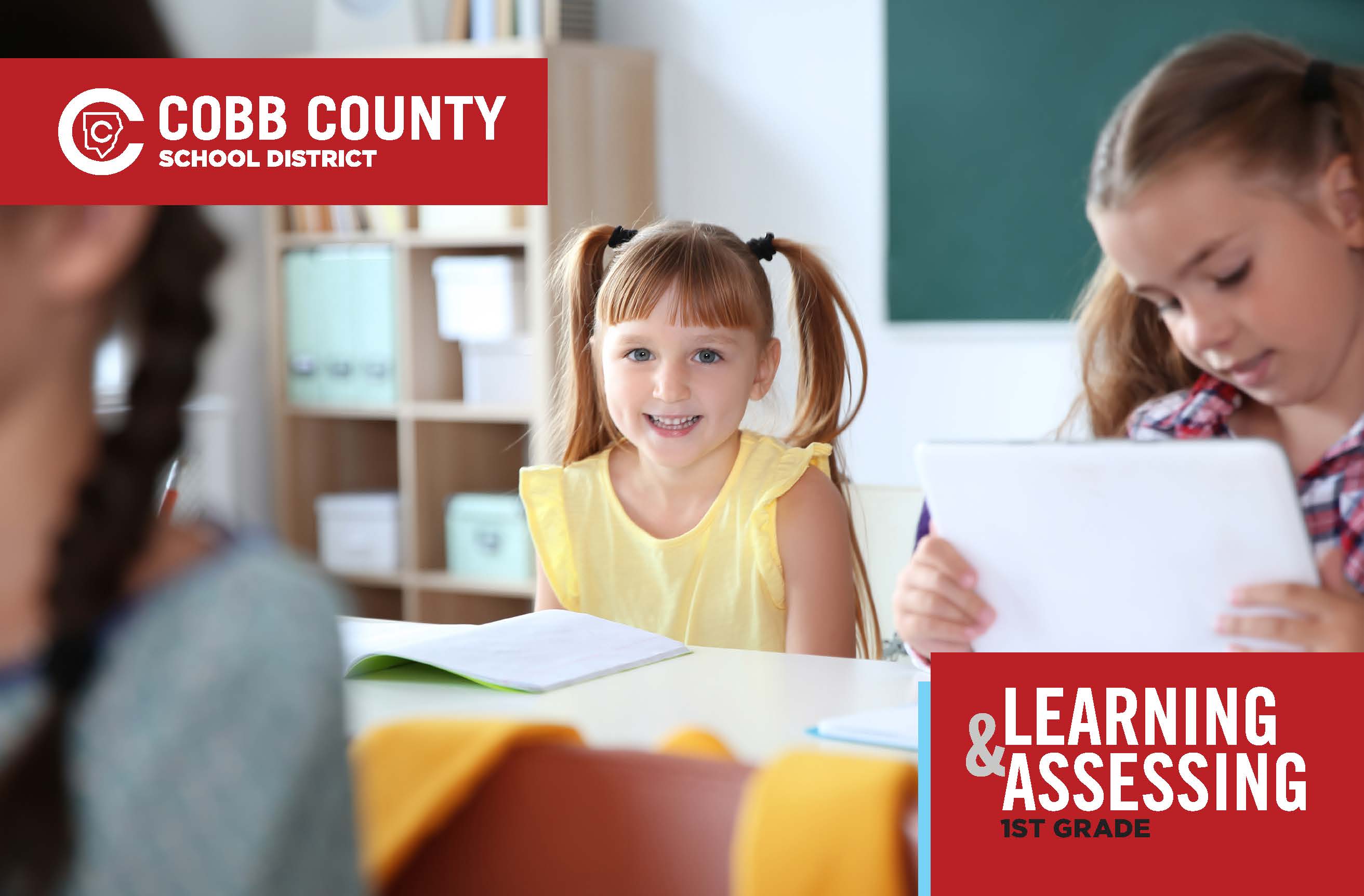1st Grade Learning

What Do Students Learn In 1st Grade?
1st GRADE LEARNING :
The Cobb County School District is committed to providing your child an academic experience that will develop his or her knowledge and skills at every grade level and to ensuring a strong foundation is established for your child to reach his or her greatest potential. Our teaching is aligned with content standards and our teachers bring those standards to life for your child through various strategies designed to meet your child’s learning strengths and needs.
In Cobb County classrooms, students are immersed every day in learning experiences based on exploration, problem-solving, and critical thinking in all content areas, including the core areas of English Language Arts, Mathematics, Social Studies, and Science; and in specialized academic content including Health, Music, Physical Education, Technology, Visual Arts, and World Languages*. Excellence in teaching guides your child’s educational experience from Kindergarten to graduation and into life.
*Programming available varies at local schools
ENGLISH LANGUAGE ARTS:
First-grade students continue developing as readers and writers through daily engagement with meaningful, structured literacy experiences. They strengthen their understanding of how print works, apply advanced phonics skills, and build a growing bank of high-frequency words to support fluent reading. As they read and listen to a variety of literary and informational texts, students learn to monitor their comprehension, retell stories with key details, and describe characters, settings, and major events. They begin to anchor their thinking to the text by using specific evidence to support ideas, make inferences, and explain their reasoning. First graders explore features of informational texts like headings and glossaries and begin identifying the main topic and key facts. In writing, they express ideas clearly for different audiences and purposes, plan and revise their work, and develop awareness of language conventions. Through classroom discussions, reading, and writing, students build their identities as thoughtful readers and writers, learning to collaborate with others and communicate effectively.
MATHEMATICS:
In Grade 1, instructional time should regularly incorporate the 8 Mathematical Practices, the Statistical Reasoning Framework, and the Mathematical Modeling Framework through four big ideas of content: (1) numerical reasoning, (2) measurement and data (statistical) reasoning, (3) patterning and algebraic reasoning, and (4) geometric and spatial reasoning. Students are expected to extend the count sequence, develop place value understanding, use part-whole strategies to add and subtract, create and describe patterns to develop algebraic reasoning, reason with measurement of time and objects, reason with shapes and their attributes, and answer real-life questions using data and statistical reasoning.
SCIENCE:
First grade students engage as hands-on explorers of the natural world, using scientific terminology to understand the similarities, differences, and basic needs of animals and plants. As young scientists, they participate in the scientific process by asking questions and making predictions about their surroundings. They develop models, use tools and technology to document their thinking, and analyze weather data with instruments. Their studies conclude with investigations into sound, light, and magnetism, sparking curiosity and deepening their understanding of the world.
SOCIAL STUDIES:
In the first grade, students continue their introduction to United States history through the study of selected historical figures. In the history strand, students study the important contributions each historical person made. In the geography strand, students learn about where these historical people lived and explore important basic geographic concepts. The civics strand provides a study of the positive character traits exhibited by these important historical figures. The economics strand continues the introduction of basic economic concepts.
SPECIALS:
Creative skills are celebrated in Visual Arts and Music in 1st grade. Students examine how artists use subject and theme and create their own works of art using basic art elements and design principles. In Music, students use pitch and rhythm to create sound stories and begin to distinguish contrasts in instruments, voices, and musical concepts. In Health, accident prevention is emphasized so students understand safety and avoiding illness and injury. In Physical Education, students explore movement, learn to share and take turns. Schools have a variety of specials that students experience. Ask your school if you would like more information about the specials they offer.
PARENTS TIPS: Reading
Daily reading as a family is an enjoyable and important way to grow a love of learning. Create time to read during breakfast or in the evening before bed. Share your own favorite childhood books and talk about why the book is one you still love. Visit your local library and take advantage of school book fairs and literacy events. By sharing what you love about reading and showing them how much it means to you by reading with them, students will see how important literacy is in their lives.
How Do We Assess Students In 1st Grade?
Your child will have a variety of classroom assessments that will aid his or her teacher in knowing how to provide the best possible instruction for your child. These assessments will also help you know how well your child is learning and what extra support may be needed. In addition, your child will participate in some standardized assessments that are used to gauge how well your child is doing in his or her grade level.
Students in 1st grade take a norm-referenced, standardized assessment called the Cognitive Abilities Test (CogAT), during first semester that helps families and teachers better understand students’ skills and strengths. The CogAT measures reasoning and problem-solving in three different areas: verbal, quantitative, and nonverbal.
All students in grades K-9 participate in the universal screening process for reading and math using a digital inventory. In 1st grade, the reading inventory measures foundational reading skills, such as letter/word identification, word recognition skills, and phonemic awareness.
Mark the Calendar: CogAT: September
Question Types: 1st grade students respond to multiple-choice questions, called selected-response. Questions are read aloud so young learners have a better chance of successfully completing all questions. Questions relate to subject areas such as English Language Arts and Math and encourage students to apply a broad range of thinking skills.
PARENT TIPS: Assessment
Parents can support students in easing any concern or anxiety about assessment:
- Talk with your child about any tests or assessments.
- Explain that assessment is a natural and important part of any learning. Tests help students understand their thinking better and make improvements for better performance in the future.
- Remind your child to pay attention to the directions and to listen carefully as they are read. Encourage your child to take time to understand the questions before selecting an answer.
- A good night’s rest is the best way to arrive focused on test day!
Remember that assessment is an important and helpful part of learning for students of all ages. Your support and involvement in your child’s education is critical to success in school and in life. Research shows when parents play a key role in their child’s learning, their child’s achievement excels.
What Instructional Resources Are Used In 1st Grade?
CLICK HERE TO DOWNLOAD A LIST OF BOARD APPROVED INSTRUCTIONAL RESOURCE FOR FIRST GRADE
Instructional resources are provided to students and teachers to support teaching and learning. The titles listed below have been recommended to our Board by a committee of teachers, parents and community representatives and approved through the textbook adoption process (See Board Rule IFAA-R). Additional resources to enhance the instruction are constantly added by local schools and individual teachers.
Course/Content Area | Resource | Publisher |
English Language Arts | Wonders | McGraw Hill |
Mathematics | Custom Developed Mathematics Content for Grade 1 | Cobb County School District |
Science | Georgia Science, Grade 1 | HMH |
Science | Science Dimensions, Grade 1 | HMH |
Social Studies | Studies Weekly | Studies Weekly |
What Is My Student's Framework For Learning In 1st Grade?
What Does The First Grade Report Card Look Like?
English – First Grade Report Card (Rev. 3/25)
Español – Boleta de Calificaciones 1er Grado (Rev. 3/25)
Portugues – Boletim da 1a Série (Rev. 3/25)

Cobb Teaching & Learning Standards - English Language Arts
CLICK HERE TO DOWNLOAD 1st GRADE COBB TEACHING & LEARNING STANDARDS FOR ELA
Cobb Teaching & Learning Standards - Mathematics
CLICK HERE TO DOWNLOAD 1st GRADE COBB TEACHING & LEARNING STANDARDS FOR MATH
Cobb Teaching & Learning Standards - Social Studies
CLICK HERE TO DOWNLOAD 1st GRADE COBB TEACHING & LEARNING STANDARDS FOR SOCIAL STUDIES
Cobb Teaching & Learning Standards - Science
CLICK HERE TO DOWNLOAD 1st GRADE COBB TEACHING & LEARNING STANDARDS FOR SCIENCE

